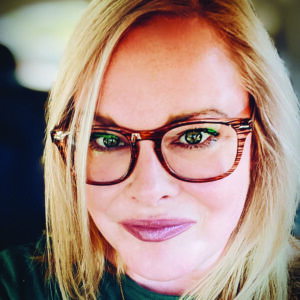by Robin Beaudoin Ownby
with Beth Duke Rushing, Licensed Professional Counselor, LPC-MHSP, NCC
Thanks to recent vaccine success in controlling the COVID-19 virus, work and social ventures are slowly returning to “new normal.” Many Americans struggled with the anxiety and uncertainness of the pandemic, and now emerging into the public is causing social anxiety. Relationships changed; people learned more about themselves with time to focus inward over the past year. Memphis therapist Beth Rushing, like many mental health professionals, has seen an uptick in business since 2020. “Straight from COVID anxiety to social anxiety,” Rushing describes her workload’s transformation.
A lifelong Memphian, Rushing’s midtown office is located at Broad and Collins, in a repurposed home her group of independent therapists calls “Autumn House.” She is grateful for her new location, which allows her to serve as an ally to the LGBTQ+ community. “The reason I went into counseling is because I love people. I love getting to know them, hearing their stories. It’s exciting to see people do hard things, get through to the other side and have a great story to tell, and feel good about their choices,” says Rushing. “Some things are difficult and sad. But it’s great to be in that moment with those people, to know they aren’t going through it alone. Seeking community and support is the opposite of weakness. I love my job, and I’m thankful to be on this side of COVID-19.”
Rushing’s focus clientele is people who have survived trauma, specializing in codependency, traumatic relationship, family issues, religious trauma, interpersonal conflict. She is also qualified to work with people who are transitioning. “I have a fairly high clientele of LGBTQ+ people. Many have experienced adverse circumstances. I treat adults, 18+. I can use EMDR (eye movement desensitization and reprocessing), allowing us to desensitize the physical and emotional response to traumatic memories. I also do experiential bodywork, such as breath work in groups.” Rushing answers some common questions about therapy:
To whom do you recommend therapy?
Anybody and everybody. My biggest piece of advice is that going to therapy doesn’t have to be only in a time of crisis. Of course, one can and should, but sometimes you’ve made a difficult choice or have a difficult relationship or issue with family. You take that to a therapist and you’re already used to the process of therapy so that when things do come up you have someone to call. Anybody can benefit from getting feedback from a professional, and some people do it just to be a better version of who they already are.
What should someone expect in a first session?
Most therapists will send you email paperwork to fill out, history. Asking questions about your goals for therapy, the priority of what you want to work on. Mostly it’s getting to know each other so the client can decide if they want to work with the therapist. It’s like an interview to see if you want to work with that therapist. Do they like your energy, the way you communicate, the way you ask questions.
How does mental health affect a person’s physical health and pain?
When we experience a traumatic event (major or minor), our body remembers things that our brain does not (fight, flight, or freeze), even when our brain doesn’t want to remember how that feels. Over time years of trauma can cause chronic stress, hormonal issues, tightness in your muscles, indigestion, stomach issues (your gut is your second brain). When we don’t address our trauma, the body holds it all in. It will manifest every which way. We use somatic/breath work to help address this.
Tips for finding the right therapist?
We refer in-house, to help find the right therapist for someone or a couple. I usually tell people that finding a therapist is a little like dating. You don’t go on a first date expecting to marry that person, so coming into the first session, you don’t have to go in with the mindset that you’re making a huge commitment to this person. You have every right to say, “that didn’t work for me, I need to go to somebody else.” I think the best way is by word of mouth- who your friends used and liked or didn’t like. On the web, Psychologytoday.com is where most independent therapists are listed, and prospective clients can reach us by phone or email and learn insurance information. It’s like a website about your practice. If you know anyone in the mental health community at all, usually they are willing to help connect the right therapist to the patient.
How confidential is our session?
100% protection with HIPAA. No information is shared outside of session. The only exception is potential harm to self or others or child/elder abuse, or if the patient signs a release to share with other medical personnel.
Common LGBTQ+ issues that come up frequently?
I find people come to me when they’re first coming out, asking how to tell people, etc. They may be religious and don’t want to lose their community or family, and sometimes they do. I help them create community through being a trusted person on their team- no matter what, giving practical first steps, and helping them find community. I’ll refer them to groups or find friends to support them and health care (chronic illness, HIV care, PrEP, doctor’s offices, getting people on medication, and getting them a solid psychiatric referral). In the last few years, I’ve been doing more LGBTQ+ couples’ counseling. There are things they have to navigate that straight couples don’t, and in a marginalized group, you will use word-of-mouth advice to find a trusted person.
Rushing adds, “I love my job. It has informed every choice in my life. I feel grateful and it is also a lot of responsibility. My clients have been so resilient this last year. The human spirit has always blown me away. It’s so encouraging to see people already go through a difficult time in life and a global pandemic.
Beth Rushing Counseling | Autumn House | 2610 Autumn Ave., 38112
(901) 209-4795 | Counseling901@gmail.com
Vaccinated patients may be seen in person.




